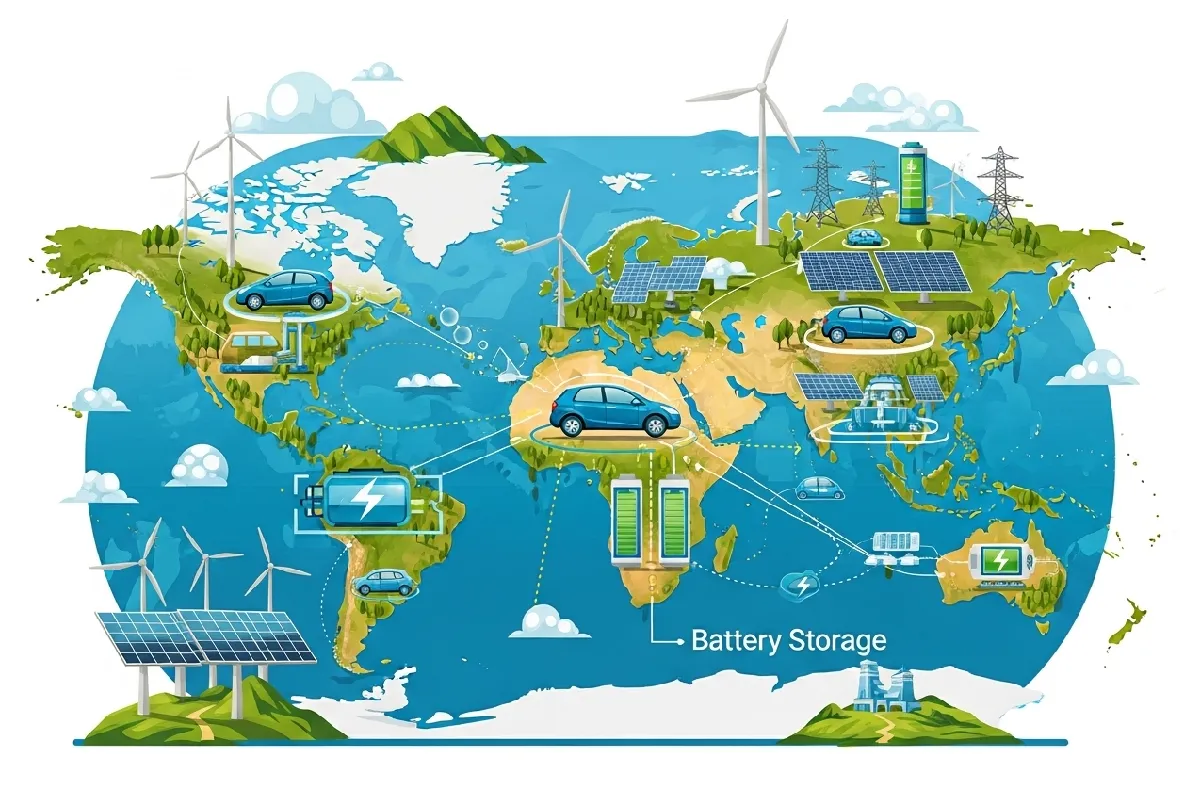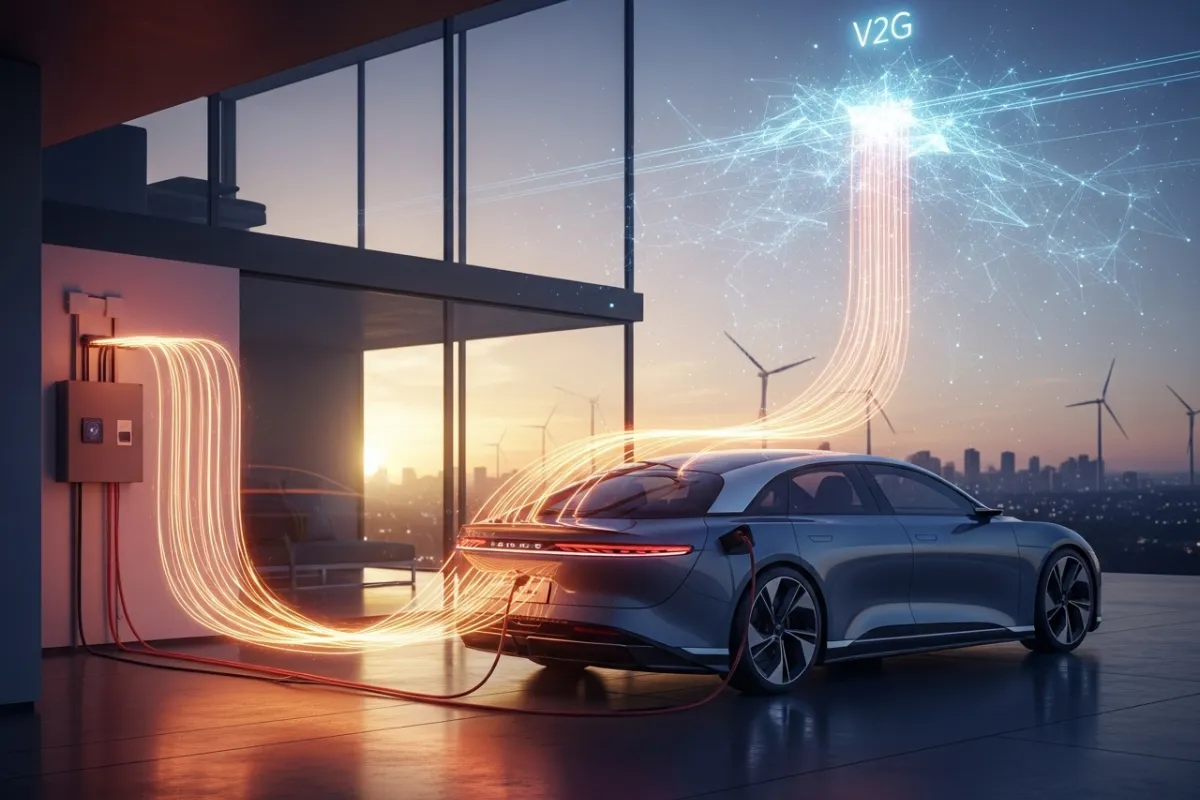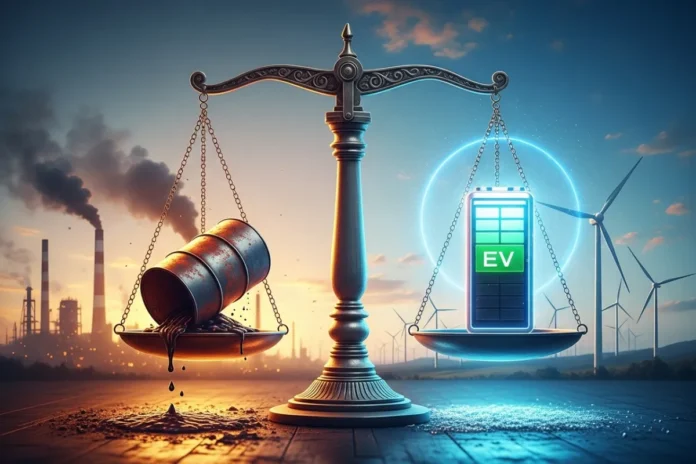Introduction to the New Oil
Electric vehicle (EV) batteries have emerged as a transformative force within the global economy, symbolically referred to as the ‘new oil.’ This term reflects the growing significance of EV batteries in shaping not only market dynamics but also geopolitical relations. As the world transitions towards sustainable energy solutions, the demand for electric vehicles has surged, leading to an increased reliance on the critical minerals required for battery production. Among these, lithium, cobalt, and nickel have become indispensable components, reshaping traditional power structures.
The reliance on these minerals poses both opportunities and challenges for nations around the world. Countries rich in resources such as lithium and cobalt are navigating a landscape where their mineral wealth elevates their geopolitical status. For instance, lithium is predominantly sourced from Australia, Chile, and Argentina, while the Democratic Republic of Congo is the leading producer of cobalt. Consequently, nations are actively seeking to secure supply chains and establish strategic partnerships to maintain a competitive edge in the burgeoning EV market.
As EV adoption expands, the competition for control over essential resources is likely to intensify, further influencing international relations. Countries are not only competing to develop their own mining capabilities but are also looking to invest in alternative sources or recycling technologies that can mitigate dependency on foreign supplies. This multifaceted competition highlights how electric vehicle batteries are not merely technological advancements but a critical aspect of global strategy and economic power.
Thus, the ‘new oil’ paradigm necessitates an understanding of how electric vehicle batteries and the associated critical minerals are reshaping the global power dynamics. The quest for a more sustainable future, powered by EVs, hinges on the ways in which nations adapt to this new reality.

The Minerals Behind the Batteries
Electric vehicle (EV) batteries are predominantly comprised of three crucial minerals: lithium, cobalt, and nickel. Each of these minerals plays a pivotal role in the overall efficiency, longevity, and performance of batteries used in electric vehicles. Understanding these components not only highlights their importance in battery technology but also sheds light on their geopolitical implications.
Lithium, known for its lightweight nature and high energy density, is a fundamental element in the lithium-ion batteries that power most electric vehicles today. The vast majority of lithium is mined from brine pools or hard rock deposits, primarily found in countries such as Australia, Argentina, and Chile. This concentration of lithium-rich regions has raised notable concerns regarding supply stability and the environmental impact of extraction processes. Furthermore, the increasing demand for EVs has driven lithium prices upward, placing this mineral at the forefront of the global trade scenario.
Cobalt serves as a critical component that enhances battery stability and capacity. However, over 60% of the world’s cobalt supply is mined in the Democratic Republic of the Congo (DRC), raising ethical concerns about mining practices and labor conditions in the region. The significant reliance on DRC for cobalt has sparked discussions on diversifying sources and increasing the sustainability of cobalt extraction. Efforts are underway to develop alternative battery technologies that minimize cobalt use or replace it altogether.
Lastly, nickel is recognized for its role in boosting energy density and battery efficiency. High-purity nickel is in demand due to its ability to enhance the distance an EV can travel on a single charge. Major reserves of nickel can be found in Indonesia, the Philippines, Russia, and Canada, making geographic variances in supply chains increasingly relevant. The competition for these minerals signifies a shift in the power dynamics of global trade as nations vie to secure their access to these essential resources.
Current Control: Who Holds the Power?
The rapid expansion of the electric vehicle (EV) market has intensified the focus on the key minerals essential for the production of EV batteries. Countries like China, Chile, Australia, and the Democratic Republic of the Congo play pivotal roles in the supply chain of these critical materials. Their control over lithium, cobalt, nickel, and graphite—the building blocks of battery technology—significantly influences the geopolitical landscape of the modern energy transition.
China, in particular, has established itself as a powerhouse in the mining and processing of these minerals. It not only supplies a large portion of the world’s lithium and cobalt but also dominates the refining process. The country’s investments in overseas mining operations have further solidified its position in the EV battery supply chain. With comprehensive policies supporting the domestic EV industry, China has effectively maintained its grip on the global market.
On the other hand, Chile and Australia are central players in lithium production. Chile’s vast salt flats, known as salars, hold some of the world’s largest lithium reserves, while Australia is currently the top producer of this essential mineral. Their stable political climates and mining-friendly regulations attract foreign investments, enabling these countries to enhance their output of this highly sought-after resource.
The Democratic Republic of the Congo stands out as a critical source of cobalt, with an astonishing share of the global supply. However, it faces ongoing challenges related to governance, human rights issues, and environmental concerns, which complicate international business relations. All these factors create a complex web of power dynamics, as nations seek to secure their interests in this crucial sector.
An interactive map illustrating the locations of major mineral mines and the geopolitical control over these vital resources reveals the intricate dependencies and competition among these nations. As the global transition toward electric vehicles accelerates, understanding who holds the power in the supply chain is essential for anticipating future trends in energy and technology.

The New OPEC: A Geopolitical Analysis
The landscape of global power is undergoing a significant transformation as countries rich in battery mineral resources emerge as a new geopolitical force, often likened to the Organization of the Petroleum Exporting Countries (OPEC). The increasing demand for electric vehicles (EVs) and renewable energy solutions has created a burgeoning market for lithium, cobalt, nickel, and other essential components used in the production of electric vehicle batteries. As a result, nations possessing these critical minerals are finding themselves in a position of unprecedented influence over the global economy and political dynamics.
Countries such as China, Australia, and the Democratic Republic of the Congo (DRC) are now central players in this evolving scenario, controlling a significant share of the world’s battery mineral supply. For instance, the DRC is home to over 70% of the global cobalt reserves, making it a linchpin in the supply chain for electric vehicle production. Consequently, these nations are leveraging their mineral wealth to negotiate better trade agreements and bolster their geopolitical standing. This shift in power does not merely affect direct trade; it also leads to strategic partnerships and alliances that could influence global markets and international relations.
Moreover, the competition for access to battery minerals has led to rising tensions among countries, particularly as they vie for dominance in the renewable energy sector. For example, the United States has recognized the importance of securing stable supplies of critical minerals to reduce its dependence on foreign entities and has initiated policies aimed at boosting domestic mining operations. This strategic pivot underscores the growing understanding that battery resources are as vital as fossil fuels were in the previous century.
As nations adapt to this new reality, their policies and practices in resource management will engage with various countries to shape global regulations and standards surrounding battery production and environmental sustainability. The implications of this shift are far-reaching, promising to redefine alliances and reshape international trade networks, creating a new form of resource-driven diplomacy and economic collaboration.
Trade Wars and Political Alliances
The transition towards electric vehicles (EVs) has initiated a reconfiguration of global trade dynamics, particularly concerning battery production. As demand for electric vehicle batteries surges, competition among nations has intensified, resulting in emerging trade wars and shifting political alliances. Countries are strategically positioning themselves within the battery supply chains to secure not only economic advantages but also geopolitical power. This shift has critical implications for global trade and national security.
One notable example is the United States’ efforts to bolster its domestic battery production capabilities. In response to increasing reliance on foreign supply chains, especially those dependent on materials sourced from countries such as China, the U.S. has introduced policies aimed at fostering local manufacturers. Initiatives such as the Inflation Reduction Act encourage investment in clean energy technologies, which includes substantial funding for battery production facilities. By nurturing domestic capabilities, the U.S. seeks to detach itself from potential supply disruptions that could arise from geopolitical tensions.
Conversely, China has solidified its position as a global leader in battery production, leveraging its abundant resource access and manufacturing expertise. The Chinese government has implemented various strategies to create advantageous trade relationships with countries rich in essential battery materials like lithium and cobalt. For instance, partnerships in Africa have yielded promising investments in mining operations, securing material supply while also establishing economic dependencies. The implications of these alliances create a complex landscape where political diplomacy intertwines with trade agreements and resource acquisition strategies.
As countries navigate these trade rivalries, the evolving battery supply chain landscape poses significant questions for national security. Nations prioritizing self-sufficiency in battery production may view their counterparts’ dependence on foreign materials as vulnerabilities, creating further tensions in international relations. The implications of these new trade dynamics will continue to play a crucial role in shaping not only the automotive industry but also broader economic and political landscapes worldwide.

Arab Nations and Economic Diversification
The shift toward electric vehicles (EVs) is currently reshaping global economic dynamics, particularly for Arab nations historically reliant on oil exports. As the demand for EV batteries surges, these countries are presented with a unique opportunity to diversify their economies by integrating themselves into the burgeoning battery supply chain. By strategically investing in this sector, Arab nations can mitigate their dependence on oil, ensuring long-term economic stability.
To capitalize on this trend, Arab nations could commence by enhancing their local capabilities in the extraction and processing of minerals essential for battery production, such as lithium, cobalt, and nickel. Many countries in the region possess substantial mineral resources, yet limited capabilities in processing these materials. By developing local facilities and technology for mineral processing, Arab nations can create value-added products, thus increasing revenue and employment opportunities.
Investment in research and development (R&D) should also be a priority. Establishing partnerships with educational institutions and private companies focused on battery technologies can foster innovation. Initiatives aimed at encouraging startups and fostering entrepreneurial ecosystems in this field will further drive development. Furthermore, participation in global supply chains for EV batteries could involve collaboration with established manufacturers, ensuring that local industries are integrated into international markets.
The transition towards a more diversified economy not only strengthens resilience against oil market fluctuations but also aligns with global sustainability goals. By adopting green technologies and improving energy efficiency in conjunction with their mineral resources, Arab nations can position themselves as key players in the EV battery market. As they navigate this transformation, close attention must be paid to regulatory frameworks, environmental impacts, and sustainable practices to create a robust and equitable battery ecosystem.
Expert Perspectives in Energy Geopolitics
The emergence of electric vehicle (EV) batteries is reshaping the global energy landscape, prompting a reevaluation of geopolitical dynamics. Experts in energy geopolitics indicate that as countries invest heavily in battery production and materials, the balance of power may shift significantly. Dr. Sarah Mitchell, a leading analyst in energy resources, emphasizes that nations rich in lithium, cobalt, and nickel, essential components for batteries, may find themselves at a strategic advantage. “The countries that control these resources will not only dictate battery prices but also influence global supply chains,” she argues.
Moreover, Professor James Liu from the Institute of Geopolitical Studies points out that the U.S. and China are in a fierce race to dominate the battery technology market. “This competition goes beyond just manufacturing; it encompasses research and development as well,” he notes, highlighting the rapid advancements in battery technologies, such as solid-state designs, which promise to enhance energy density and safety.
In addition to resource control, sustainability concerns play an essential role in reshaping the geopolitics of energy. Dr. Emily Carter, an environmental strategist, notes that as countries commit to decarbonization targets, the demand for energy storage solutions that can support renewable energy initiatives is set to grow. “Battery technology is being viewed not only as a commodity but as a key enabler of a sustainable energy future,” she points out.
Finally, the interplay between global politics and the battery supply chain will likely lead to new alliances and conflicts. Experts suggest that nations may forge partnerships based on technology sharing and resource access, which could redefine traditional alliances. With the battery industry at the forefront of energy evolution, the insights from these experts underscore the importance of understanding the geopolitical implications of this sector.

The Future of Energy Production and Consumption
The transition to electric vehicle (EV) batteries is poised to redefine energy production and consumption across the globe. As governments and industries increasingly prioritize sustainability, the demand for efficient battery technology is expected to surge. This demand is driving innovation in battery chemistry, recycling processes, and energy management systems. Enhanced performance, longer lifespans, and lower carbon footprints are anticipated as manufacturers focus on creating next-generation lithium-ion batteries, solid-state batteries, and other alternative technologies. These innovations not only aim to improve the efficiency of electric vehicles but also contribute to broader energy storage solutions, including grid stabilization and integration with renewable energy sources.
Consumer behavior is also evolving in response to these advancements. The growing awareness of climate change has prompted many individuals to reconsider their transportation choices, with a significant increase in the adoption of electric vehicles. As consumers prioritize eco-friendly options, it triggers a ripple effect in the market, compelling manufacturers to invest in cleaner technologies, expanding the EV battery supply chain from raw materials to end-of-life management. This shift may fundamentally alter how energy is consumed, favoring decentralized generation models and enabling local energy markets where surplus renewable energy can be traded alongside battery-stored power.
Geopolitical dynamics are inevitably reshaped as well. Countries rich in lithium, cobalt, and other essential battery materials are gaining strategic leverage, influencing global power structures. The race for securing these resources could lead to new alliances and trade policies favoring nations that prioritize sustainable practices. Furthermore, as battery production becomes increasingly localized, regions adapting quickly to the growing need for EV batteries may become economic leaders, while those slow to transition may face challenges.
Conclusion: A Changing Global Landscape
The shift towards electric vehicles (EVs) and their corresponding battery technologies represents a significant transformation in the global economy, akin to the historical impact of oil. As countries and industries navigate this emerging terrain, understanding the geopolitical implications of battery production is crucial. The dominance of lithium-ion batteries, which currently power most electric vehicles, is reshaping not only market dynamics but also international relations and supply chains.
Various nations are beginning to recognize the strategic importance of securing access to crucial raw materials such as lithium, cobalt, and nickel. Countries rich in these resources are positioned to gain leverage, leading to new alliances and potentially altering traditional power structures. For instance, nations in Africa, South America, and Australia that possess significant mineral deposits are increasingly sought after in the race for battery materials. This quest for resource security highlights the necessity for a comprehensive understanding of the geopolitical landscape shaped by the demand for electric vehicle batteries.
Moreover, advancements in recycling technologies and the development of alternative battery chemistries are set to play pivotal roles in determining which countries will emerge as leaders in this new industrial revolution. Industries must also adapt to evolving regulatory frameworks and consumer expectations surrounding environmental sustainability and climate change mitigation. This gradual transition to an EV-centric future underscores the pressing need for nations and businesses to proactively adapt to these changes to maintain competitiveness in a rapidly evolving market.
In summary, as the world shifts towards electric vehicles, the implications of battery production on global power dynamics cannot be overlooked. Stakeholders must remain vigilant and innovative, capitalizing on emerging opportunities while mitigating potential risks associated with this transformative shift.




